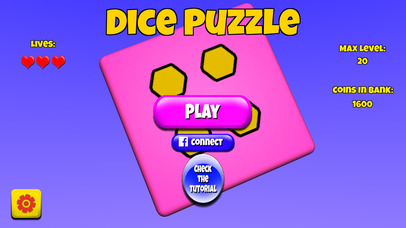
Dice Puzzle: Logic and Memory app for iPhone and iPad
Try to memorize your way out of the puzzle, when your memory fails you, you will need your brain!
Dice puzzle is a great game of memory and tactical thinking. It is a game of concentration with a twist! You are a young die who has lost his significant other to an ugly evil creature! To save your loved one you need to beat the ugly evil creatures 100 minions!
How To Play: The game is designed to be a one finger experience. Each level the minion will start to roll the dices. But whatever he presses all the dice next to it will turn too. You should start to memorize the pressed die and mimic his behaviors.
Remember, the game will start slow and forgiving at the start. But it wont stay that way for long. Soon you will start to hit to a place where dice are turning everywhere! Try to memorize as much as possible and press those dice at the start of the level. Then for the last a few remaining moves, you can actually strategically play with dice.
There are 3 lives which you can lose by losing a game or restarting a level. To gain lives you should just wait 30 minutes. Honestly, I think it is a good thing that you can put down the mobile stuff away for a while and enjoy with your loved ones!
If you win a level, in mid screen you can play another dice game or watch an advertisement or share the game in the Facebook for extra points!
Remember puzzle games are great for your mental health. In Wikipedia, it is said "A puzzle is a game, problem, or toy that tests a persons ingenuity or knowledge. In a puzzle, one is required to put pieces together in a logical way, in order to arrive at the correct solution of the puzzle. There are different types of puzzles for different ages, such as crossword puzzles, word-search puzzles, number puzzles, or logic puzzles.
Puzzles are often devised as a form of entertainment but they can also arise from serious mathematical or logistical problems. In such cases, their solution may be a significant contribution to mathematical research.
Solutions of puzzles often require the recognition of patterns and the creation of a particular kind of order. Sometimes not because of how complicated and diagonal the pattern can get. People with a high level of inductive reasoning aptitude may be better at solving such puzzles than others. But puzzles based on inquiry and discovery may be solved more easily by those with good deduction skills. Deductive reasoning improves with practice."
Another part of the game is Dice! (Dice (singular die or dice; from Old French dé; from Latin datum "something which is given or played") are small throwable objects with multiple resting positions, used for generating random numbers. Dice are suitable as gambling devices for games like craps and are also used in non-gambling tabletop games.
A traditional die is a cube, with each of its six faces showing a different number of dots (pips) from 1 to 6. When thrown or rolled, the die comes to rest showing on its upper surface a random integer from one to six, each value being equally likely. A variety of similar devices are also described as dice; such specialized dice may have polyhedral or irregular shapes and may have faces marked with symbols instead of numbers. They may be used to produce results other than one through six. Loaded and crooked dice are designed to favor some results over others for purposes of cheating or amusement.
A dice tray, a tray used to contain thrown dice, is sometimes used for gambling or board games, in particular to allow dice throws which do not interfere with other game pieces.
And little history about dice:
Dice have been used since before recorded history, and it is uncertain where they originated. The oldest known dice were excavated as part of a backgammon-like game set at the Burnt City, an archeological site in south-eastern Iran, estimated to be from between 2800–2500 BCE. Other excavations from ancient tombs in the Indus Valley civilization indicate a South Asian origin.



